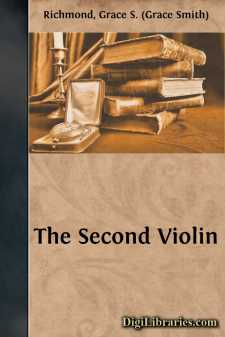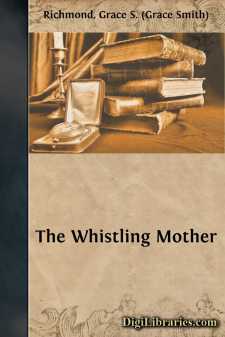Categories
- Antiques & Collectibles 13
- Architecture 36
- Art 48
- Bibles 22
- Biography & Autobiography 813
- Body, Mind & Spirit 142
- Business & Economics 28
- Children's Books 17
- Children's Fiction 14
- Computers 4
- Cooking 94
- Crafts & Hobbies 4
- Drama 346
- Education 46
- Family & Relationships 57
- Fiction 11829
- Games 19
- Gardening 17
- Health & Fitness 34
- History 1377
- House & Home 1
- Humor 147
- Juvenile Fiction 1873
- Juvenile Nonfiction 202
- Language Arts & Disciplines 88
- Law 16
- Literary Collections 686
- Literary Criticism 179
- Mathematics 13
- Medical 41
- Music 40
- Nature 179
- Non-Classifiable 1768
- Performing Arts 7
- Periodicals 1453
- Philosophy 64
- Photography 2
- Poetry 896
- Political Science 203
- Psychology 42
- Reference 154
- Religion 513
- Science 126
- Self-Help 84
- Social Science 81
- Sports & Recreation 34
- Study Aids 3
- Technology & Engineering 59
- Transportation 23
- Travel 463
- True Crime 29
The Second Violin
Categories:
Description:
Excerpt
CHAPTER I
Crash! Bang! Bang! "The March of the Pilgrims" came to an abrupt end. John Lansing Birch laid down his viola and bow, whirled about, and flung out his arms in despair. "Oh, this crowd is hopeless!" he groaned. "Never mind any other instrument, providing yours is heard. This march is supposed to die away in the distance! You murder it in front of the house. That second violin--"
Here his wrath centered upon the red-cheeked, black-eyed young player.
The second violin returned his gaze with resentment. "What's the use of my playing like a midsummer zephyr when Just's sawing away like mad on the bass?" she retorted.
The first violin smiled pleasantly on the little group. "Let's try it again," she suggested, "and see if we can please John Lansing better."
"You're all right," said Lansing, with a wave of his hand at Celia, "if the rest of the strings wouldn't fight to drown you out. Charlotte plays as if second violin were a solo part, with the rest as accompaniment."
Charlotte tucked her instrument under a sulky, round chin, raised her bow and waited, her eyes on the floor. Celia, smiling, softly tried her strings.
"That's it, precisely," began the leader, still with irritation. "Celia tunes between practice; Charlotte takes it for granted she's all right and fires ahead. Your E string is off!"
The second violin grudgingly tightened the E string; then all her strings in turn, lengthening the process as much as possible. The 'cello did the same--the 'cello always stood by the second violin. Jeff gave Charlotte a glance of loyalty. His G string had been flatter than her E.
Lansing wheeled about and picked up his instrument, carefully trying its pitch. He gave the signal, and the "March of the Pilgrims" began--in the remote distance. The double-bass viol gripped his bow with his stubby twelve-year-old fingers, and hardly breathed as he strove to keep his notes subdued. The 'cello murmured a gentle undertone; the first violin sang as sweetly and delicately as a bird, her legato perfect. The second violin fingered her notes through, but the voice of her instrument was not heard at all.
The leader glanced at her once, with a frown between his fine eyebrows, but Charlotte played dumbly on. The Pilgrims approached--crescendo; drew near--forte; passed--fortissimo; marched away--diminuendo; were almost lost in the distance--piano--pianissimo. Uplifted bows--and silence.
"Good!" said a hearty voice behind them. Everybody looked up, smiling--even the second violin. His children always smiled when Mr. Roderick Birch came in. It would have been a sour temper which could have resisted his genial greeting.
"Mother would like the 'Lullaby' next," he said. "She's rather tired to-night. And after the 'Lullaby' I want a little talk with you all."
Something in his voice or his eyes made his elder daughter take notice of him, as he dropped into a chair by the fire. "Play your best," she warned the others, in a whisper. But they needed no warning. Everybody always played his best for father. And if mother was tired--
The notes of the second violin fell daintily, caressing those which wrought out the melody enveloping but never overwhelming them. As the music ceased, the leader, turning to the second violin, met her reluctant eyes with a softening in his own keen ones. The hint of a laugh curved the corners of her lips as his smiled broadly. It was all the truce necessary. Charlotte's sulks never lasted longer than Lanse's impatience.
They laid aside their instruments and gathered round their father. Graceful, brown-eyed Celia sat down beside him; Charlotte's curly black hair mingled with his heavy iron-gray locks as she perched upon the arm of his chair, her scarlet flannel arm under his head. The youngest boy, Justin, threw himself flat on the hearth-rug, chin propped on elbow, watching the fire; sixteen-year-old Jeff helped himself to a low stool, clasping long arms about long legs as his knees approached his head in this posture; and the eldest son, pausing, drew up a chair and sat down to face the group.
"Now for it," he said. "It looks serious--a consultation of the whole. Mayn't we have mother to back us?"
"I've sent mother to bed," Mr. Birch explained. "She wanted to come down to hear you play, but I wouldn't let her. And indeed there are moments--" He glanced quizzically at his eldest son.
"Yes, sir," Lansing responded, promptly. "There are moments when the furnace pipes convey up-stairs as much din as she can bear."
Mr. Birch sat looking thoughtfully into the fire for a minute or two.
He began at last, gently, "Celia--has mother seemed quite strong to you of late?"
"Mother--strong?" asked Celia, in surprise. "Why, father, isn't she? She--had that illness last winter, and was a long time getting about, but she has seemed well all summer."
Their eyes were all upon his face. Even young Justin had swung about upon his elbows and was regarding his father with attention. They waited, startled.
"I took her to Doctor Forester to-day, and he--surprised me a good deal. He seemed to think that mother must not spend the coming winter in this climate. Don't be alarmed; I don't want to frighten you, but I want you to appreciate the necessity. He thinks that if mother were to have a year of rest and change we need have no fears for her."
"Fears!" repeated Lansing, under his breath. Was it possible that anything was the matter with mother? Why, she was the central sun about which their little family world moved! There could not--must not--be anything wrong with mother!
"Tell us plainly, father," urged Celia's soft voice. She was pale, but she spoke quietly.
Charlotte, at the first word of alarm, had turned her face away. Jeff's bright black eyes--he was Charlotte's counterpart in colouring and looks--rested anxiously on the second violin's curly mop of hair, tied at the neck with a big black bow of ribbon. It was always most expressive to Jeff, that bow of ribbon.
Lansing repeated Celia's words. "Yes, tell us plainly, sir. We'd rather know."
"I am alarming you," Mr. Birch said, quickly. "I knew I could not say the slightest thing about her without doing that. But I need to talk it over with you all, because if we carry out the doctor's prescription it means much sacrifice for every one. I had no doubt that you would make it, but I think it is better for you to understand its importance. Doctor Forester says New Mexico is an almost certain cure for such trouble as mother's, if taken early. And we are taking it early."
Justin and Jeff looked puzzled, but Celia caught her breath, and Lansing's ruddy colour suddenly faded. Charlotte buried her head in her father's shoulder and drew the scarlet flannel arm tighter about his neck.
The iron-gray head bent over the curly black one for a moment, as if the strong man of the household found it hard to face the anxious eyes which searched his, and would have liked, like his eighteen-year-old daughter, to run to cover. But in an instant, he looked up again and spoke in the cheery tone they knew so well.
"Now listen, and be brave," he said. "Mother's trouble is like a house just set on fire. A dash of Water and a blanket--and it is out. Wait till a whole room is ablaze, and it's a serious matter to stop it. Now, in our case, we've only the little kindling corner to smother, and the New Mexico air is water and blanket--a whole fire department, if need be. The doctor assures me that with mother's good constitution, and the absence of any hereditary predisposition to this sort of thing, we've only to give her the ten or twelve months of rest and reënforcement--the winter in New Mexico, the summer in Colorado--to nip the whole thing in the bud. I believe him, and you must believe him--and me. More than all, you must not show the slightest change of front to her. She knows it all, but she doesn't want you to know. I think differently about that.
"Three of you are men and women now, and the other two," he smiled into the upturned, eager faces of Jeff and Justin, "are getting to be men. Even my youngest can be depended upon to act the strong part."
Justin scrambled to his feet at that, and gravely laid a muscular boy's hand in his father's.
"I'll stand by you, sir," he said.
Nobody laughed. Charlotte's black bow twitched and a queer sound burst from the shoulder where her head was buried. Jeff's thick black lashes went down for a moment; Celia shook two bright drops from brimming eyes and patted Just's sturdy shoulder. Mr. Birch shook the hand vigorously without speaking, and only Lansing found words to express what they felt.
"He speaks for us all, I know, sir. And now if you'll tell us our part we'll take hold. I think I know what it means. Trips to New Mexico, from New York, are expensive."
"They are very expensive," Mr. Birch replied, slowly. "I must go with her. We must travel in the least fatiguing fashion, which means state-rooms on trains and many extras by the way. She has kept up bravely, but this unusual exhaustion after one day in town shows me how careful I must be of her on the long journey. Then, once away, no expense must be spared to make the absence tell for all there is in it. And most of all to be considered, while I am away there will be--no income."
They looked at each other now, Celia at Lansing, and Lansing at Jeff, and Jeff at both of them. Charlotte sat up suddenly, her cheeks and eyes burning, and stared hard at each in turn.
The income would stop. And what would that mean? The family had within three years suffered heavy financial losses from causes outside of their control, and the father's income, that of attorney-at-law in a large suburban town, had since become the only source of support. So far it had sufficed, although Charlotte and Celia had been sent away to school, and both Celia and Lansing were now in college.
It was the remembrance of these heavy demands upon the family purse which now caused the young people to look at one another with startled questioning. Lansing was about to begin his senior year at a great university; Celia had finished her first year at a famous women's college. Within a fortnight both were expecting to begin work.
Charlotte did not care about a college course, but she had planned for two years to go to a school of design, for she was a promising young worker in things decorative. As for Jefferson, sixteen years old, captain of the high-school football team, six feet tall, and able to give his brother Lansing a hard battle for physical supremacy, his dearest dream was a great military school. Even Justin--but Justin was only twelve--his dreams could wait. His was the only face in the group which remained placid during the moments succeeding Mr. Birch's mention of the astonishing fact about the income.
The father's observant eyes noted all that his children's looks could tell him of surprise, disappointment and bewilderment; and of the succeeding effort they made to rally their forces and show no sign of dismay.
Lansing made the first effort. "I can drop back a year," he said, thoughtfully. "Or I--no--merely working my way through this year wouldn't do. It wouldn't help out at home."
"Why, Lanse!" began Celia, and stopped.
He glanced meaningly at her, and the colour flashed back into her cheeks. In the next instant she had followed his lead.
"If Lanse can stay out of college, I can, too," she said, with decision.
"If I could get some fairly good position," Lanse proposed, "I ought to be able to earn enough to--well, we're rather a large family, and our appetites----"
"I could do something," began Charlotte, eagerly. "I could--I could do sewing----"
At that there was a general howl, which quite broke the solemnity of the occasion. "Charlotte--sewing!" they cried.
"Why not take in washing?" urged Lanse.
"Or solicit orders for fancy cooking?"
"Or tutor stupid little boys in languages? Come! Fiddle--stick to your specialty."
Charlotte's face was a study as she received these hints. They represented the things she disliked most and could do least well. Yet they were hardly farther afield than her own suggestion of sewing. Charlotte's inability with the needle was proverbial.
"What position do you consider yourself eminently fitted for, Mr. Lansing Birch?" she inquired, with uplifted chin.
"You have me there," her brother returned, good-humouredly. "There's only one thing I can think of--to go into the locomotive shops. Mechanics' wages are better than most, and a little practical experience wouldn't hurt me."
It was his turn to be met with derision. It could hardly be wondered at, for as he stood before them, John Lansing looked the personification of fastidiousness, and his face, although it surmounted a strongly proportioned and well developed body, suggested the mental characteristics not only of his father, but of certain great-grandfathers and uncles, who had won their distinction in intellectual arenas. Even his father seemed a little daunted at this proposal.
"That's it--laugh!" urged Lanse. "If I'd proposed to try to get on the 'reportorial staff' of a city newspaper you'd all smile approval, as at a thing suited to my genius. I'd have to live in town to do that, and what little I earned would go to fill my own hungry mouth. Now at the shops--you needn't look so top-lofty! Dozens of fellows who are taking engineering courses put on the overalls, shoulder a lunch-pail and go to work every morning during vacation at seven o'clock. They come grinning home at night, their faces black as tar, their spirits up in Q, jump into a bath-tub, put on clean togs, and come down to dinner looking like gentlemen--but not gentlemen any more thoroughly than they have been all day."
Jeff looked at his brother seriously. "Lanse," he said, "if you go into one of the locomotive shops won't you get a place for me?"
But Celia interposed. "Whatever the rest of us do," she said, "Jeff and Just must keep on with school."
Jeff rebelled with a grimace. "Not much!" he shouted. "I guess one six-footer is as good as another in a boiler-shop. You don't catch me swallowing algebra and German when I might be developing muscle. If Lanse puts on overalls I'm after him."
Celia looked at her father. "What do you think of all this, sir?" she asked. "If I stay at home, dismiss Delia, and do the housework myself, and Lanse finds some suitable position, can't we get on? Charlotte can put off the school of design another year. We will all be very economical about clothes----"
"Being economical doesn't bring in cash to pay bills," interrupted Jeff. "Do the best he can, Lanse won't draw any hair-raising salary the first year. He could probably get clerical work at one of the banks, but what's that? He'd fall off so in his wind I could throw him across the room in three months."
They all laughed. Jeff's devotion to athletics dominated his ideals at all times, and his disgust at the thought of such a depletion of his brother's physical forces was amusing.
Celia was still looking at her father. He spoke in the hearty tone to which they were accustomed, his face full of satisfaction.
"You please me very much, all of you," he said. "It will be the best tonic I can offer your mother. Her greatest trial is this very necessity, which she foresaw the instant the plan was formed--so much sacrifice on the part of her children. Yet she agreed with me that the experience might not be wholly bad for you, and she said"--he paused, smiling at his elder daughter--"that with Celia at the helm she was sure the family ship wouldn't be wrecked"
Then he told them that they might plan the division of labour and responsibility as they thought practicable. He agreed with Celia that the younger boys must remain in school, but added--since at this point it became necessary to mollify his son Jefferson--that a fellow with a will might find any number of remunerative odd jobs out of school and study hours. He commended Lansing's idea, but advised him to look around before deciding; and he passed an affectionate hand over Charlotte's black curls as he observed that young person sunk in gloom.
"Cheer up, little girl!" he said. "The second violin is immensely important to the music of the family orchestra. The hand that can design wall-papers can learn to relieve the mistress of the house of some of her cares. Celia, without a maid in the kitchen, will find plenty of use for such a quick brain as lies under this thatch."
But at this moment something happened--something to which the family were not unused. Charlotte suddenly wriggled out from under the caressing hand, and in half a dozen quick movements was out of the room. They had all had a vision of brilliant wet eyes, flushing cheeks, and red, rebellious mouth.
"Poor child!" murmured Celia. "She thinks we find her of no use."
"She is rather a scatterbrain," Lanse observed. "The year may do her good, as you say, father--as well as the rest of us," he added, with modesty.
"There's a lot of things she can do, just the same,"--Jeff fired up, instantly--"things the rest of us are perfect noodles at. When she gets to earning more money in a day than the rest of us can in a month maybe we'll let up on that second-fiddle business."
"Good for you, you faithful Achates!" said Lanse. Then he turned to his father. "You haven't told us yet when you go, sir."
"If we can, two weeks from to-day," said Mr. Birch. Then he went up-stairs to tell his wife that she might go peacefully to sleep, for her children were ready to become her devoted slaves. Justin followed Jeff out of the room, and Jeff broke away from this younger brother and hastened to rap a familiar, comforting signal of comradeship on Charlotte's locked door.
Left alone, Lanse and Celia looked at each other.
"Well, old girl--" began Lansing, gently.
"O Lanse!" breathed Celia.
He patted her shoulder. "Bear up, dear. It's tough to give up college for a year--"
"Oh, that's not it!" cried the girl, and buried her face in a sofa pillow.
"No, that's not it," he answered, under his breath. He shook his shoulders and walked away to the fire, stood staring down into it for a minute with sober eyes, then drew a long breath and came back to his sister.
"It's a relief that there's something we can do to help her get well," he said, slowly. "And she will get well, Celia--she will--she must!"
"Where's the shawl-strap?"
"Charlotte, wait just a moment; are you perfectly sure that mother's dressing sack and knit slippers are in the case? Nobody saw them put in, and I don't--"
"Justin, run down-stairs, please, and get that unopened package of water-biscuit. You'll find it on the pantry shelf, I think."
"Lanse, if the furnace runs all night with the draught on, your fire will be burned out in the morning, and it will take an extra amount of coal to get it started again."
"Where's Jeff? He must be told about--"
"Put mother's overshoes to warm."
"I have left two hundred dollars to your credit at the bank, Lansing, and I--"
"Lanse, did you telephone for--"
"Where did Celia put the--"
"Listen, all of you. I--"
"What did Jeff do with that small white--"
"Silence!" shouted Lansing, above the din. "Can't you people get these traps together without all yelling at once? You will have












